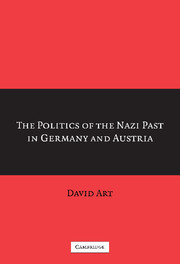Book contents
- Frontmatter
- Contents
- Preface and Acknowledgments
- The Politics of the Nazi Past in Germany and Austria
- 1 Introduction
- 2 Public Debates and Political Change
- 3 The Culture of Contrition
- 4 The Victim Culture
- 5 Combating the Far Right in Germany
- 6 Taming the Far Right in Austria?
- 7 Conclusions and Extensions
- Appendix A Coding Scheme for Die Zeit Content Analysis
- Appendix B Breakdown of Interviews Conducted
- Appendix C Coding Semistructured Interviews with German Politicians
- Appendix D Coding Semistructured Interviews with Austrian Politicians
- Appendix E Question Set – Germany
- Appendix F Question Set – Austria
- Bibliography
- Index
4 - The Victim Culture
Published online by Cambridge University Press: 15 December 2009
- Frontmatter
- Contents
- Preface and Acknowledgments
- The Politics of the Nazi Past in Germany and Austria
- 1 Introduction
- 2 Public Debates and Political Change
- 3 The Culture of Contrition
- 4 The Victim Culture
- 5 Combating the Far Right in Germany
- 6 Taming the Far Right in Austria?
- 7 Conclusions and Extensions
- Appendix A Coding Scheme for Die Zeit Content Analysis
- Appendix B Breakdown of Interviews Conducted
- Appendix C Coding Semistructured Interviews with German Politicians
- Appendix D Coding Semistructured Interviews with Austrian Politicians
- Appendix E Question Set – Germany
- Appendix F Question Set – Austria
- Bibliography
- Index
Summary
Sixty years after the end of the Second World War, the Nazi past has become a salient and divisive issue in Austrian politics. In May 2002, political parties debated the meaning of May 8th and proponents of diverging historical interpretations clashed in the streets of Vienna. Several weeks earlier, members of the Austrian People's Party (ÖVP) and the Austrian Freedom Party (FPÖ) had condemned the revised edition of the Wehrmachtsausstellung, while Green and Social Democratic (SPÖ) politicians delivered opening speeches praising it. In November 2000, Chancellor Wolfgang Schüssel (ÖVP) and the head of the Green Party, Alexander Van der Bellen, publicly sparred over whether Austria was primarily a victim, as Schüssel claimed, or a perpetrator during the Second World War. Since the formation of the ÖVP-FPÖ coalition in February 2000, the battle lines in these and other historical debates have been clearly drawn, pitting the right (the FPÖ, the ÖVP, and the conservative press) against the left (the Greens, the SPÖ, and the liberal press), and members of all parties regularly accuse their opponents of using history for partisan political gain.
The current polarization of Austrian historical consciousness is surprising given the elite consensus, which held for over four decades, that Austria was Hitler's first victim. To paraphrase an old joke, “the Austrians succeeded in convincing themselves and the world that Beethoven was an Austrian and Hitler was a German.” The Holocaust was Germany's problem.
- Type
- Chapter
- Information
- The Politics of the Nazi Past in Germany and Austria , pp. 101 - 144Publisher: Cambridge University PressPrint publication year: 2005

